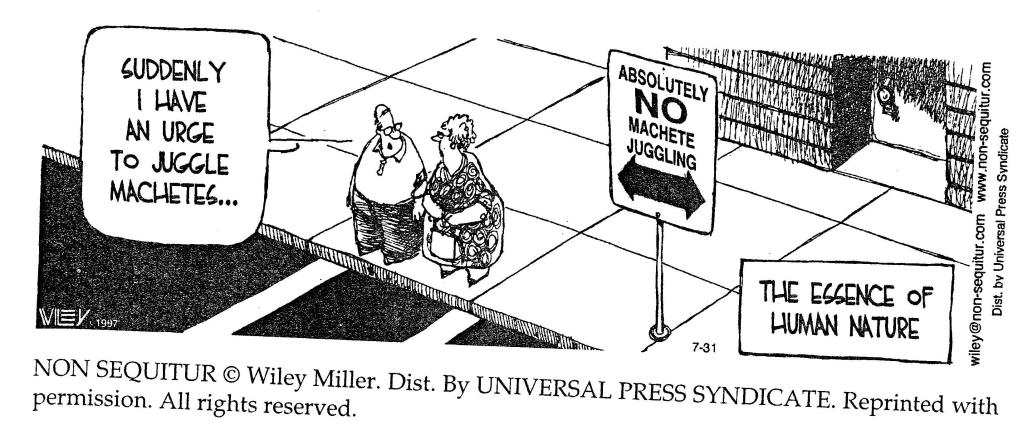This deep-truth-about-human-nature cartoon reminds me of two quotations from John Locke and John Stuart Mill.


Locke on freedom of choice for students: “great care is to be taken, that [education] be never made as a business to him, nor he look on it as a task. We naturally, as I said, even from our cradles, love liberty, and have therefore an aversion to many things, for no other reason, but because they are enjoin’d us. I have always had a fancy, that learning might be made a play and recreation to children; and that they might be brought to desire to be taught, if it were proposed to them as a thing of honour, credit, delight, and recreation … .” (Some Thoughts concerning Education, Section 148)

And now Mill on freedom of movement: “Many a person remains in the same town, street, or house from January to December, without a wish or thought tending towards removal, who, if confined to that same place by the mandate of authority, would find the imprisonment absolutely intolerable.” (Principles of Political Economy, p. 213)
Related: Locke and Mill in my Philosophers, Explained series.
“We naturally, as I said, even from our cradles, love liberty”
I don’t think this as true. It seems to have many similarities to the noble-at-birth-corrupted-by-society belief of the Left. While I don’t agree with the exact formulation, I think that the Conservative belief of “tending towards depravity” is a much more accurate view of humanity.
Locke comes across as a delusional utopian in many ways.
10×10: Belief in human nature “tending towards depravity” sounds very Christian. That particular doctrinal system defined human nature as such depraved, and condemned every human attempt to act in accord with it. We cannot deny it was a brilliant marketing strategy: create sin and cash in on the guilt by selling one’s product: salvation.
Ironically political i.e. coercive utopianism was something Locke implicitly fought against in articulating the blueprint of a liberal government that so greatly influenced the American founding fathers. In contrast to virtually every other religious and philosophical political theory from that enunciated by Plato in ‘The Republic’ to the “divine right” of Christian monarchs to the Caliphate of Islamists to collectivist doctrines based on the received revelations of Hegel and Marx, Enlightenment thinkers held that the state was not a tool to be placed in the hands of utopian visionaries. Their influence was to be restricted to persuasion and voluntary cooperation only. America was conceived as a polity free of coercive utopians – a prescription for utopia if I’ve heard one.
Christianity is ultimately mythology overset with philosophy. But that doesn’t mean that many of its observations about human nature were totally wrong. “Tending towards depravity” and Original Sin seem to me to be closer to reality than the blank slate worldview which is held by both Leftists and libertarians/Randians.
Its not that human nature is *totally* depraved. Its that humans have biological predispositions such that without the boundaries set by social custom, law, morality and political enforcement tend in humans acting destructively (human sexual nature itself is largely pre-rational and inherently conflict ridden; ie tension between short and long term mating pressures).
Thus all of the “sins”. Again another religious term but religion is an expression of deeper biological imperatives. In fact, religion is just the more primitive manifestation of biological imperatives. Its an overlay of the one true god; the god of bio-mechanics. Religion was an attempt to control mankind’s baser animal instincts so civilization could flourish. The Left is systematically undoing every thing that Western Christianity helped to create; the totality of Euro-American culture. I’m more sympathetic with Christianity than with Leftism or with the blank slate naivety of libertarians.
Regarding Locke, you’re reading of him is overly generous. Locke, in fact all of the Classical Liberals (especially Jefferson) come across as naive in their view of human nature. Their views on liberty were based on an assumptions that evolutionary and genetic science is disproving. Society can not avoid self-liquidation on an atomistic individualist platform. Individuals need to fit into larger wholes, the most important of which is genetic relatedness. There are limits to how much genetic diversity a societal network can sustain. The West is basically moving down the path of demographic destruction. With the growing disappearance of Europeans, Western civilization will also disappear. Or be transformed. And that includes the Classical Liberal Republics that the early liberals so painfully built. Without Europeans there will be no European culture.
The older I get I see the Classical Liberal worldview as being on the verge of being obsolete. I fear that only a Reactionary politics and worldview will exist as an alternative to Leftism. Right liberalism devolves into Left liberalism which devolves into civilizational collapse which is what we are going through now. The future is a renewed bio politics. Maybe if all the world were North Europeans like John Locke then right liberalism would work. But sadly it is not. I do not say that with joy. I would like to believe in the utopian liberalism of Locke and Rand. But the world around me gives me 100 reasons to see it as well intentioned folly. And that is 100 reasons almost every day.